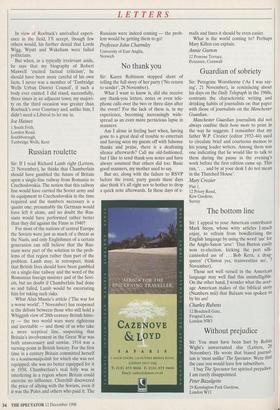Russian roulette
Sir: If I read Richard Lamb right (Letters, 21 November), he thinks that Chamberlain should have gambled the future of Britain upon a single-line railway from Romania to Czechoslovakia. The notion that this railway line would have carried the Soviet army and its equipment to Czechoslovakia in the time required and the numbers necessary is a quaint one; presumably the Germans would have left it alone, and no doubt the Rus- sians would have performed rather better than they did against the Finns in 1940?
For most of the nations of central Europe the Soviets were just as much of a threat as the Nazis, and only Englishmen of a certain generation can still believe that the Rus- sians were part of the solution to the prob- lems of that region rather than part of the problem. Lamb may, in retrospect, think that British lives should have been gambled on a single-line railway and the word of the Romanian foreign minister and of the Sovi- ets, but no doubt if Chamberlain had done so and failed, Lamb would be excoriating him for taking such risks.
What Alan Massie's article (`The war for a worse world', 7 November) has reopened is the debate between those who still hold a Whiggish view of 20th-century British histo- ry — the two world wars were righteous and inevitable — and those of us who take a more sceptical line, suspecting that Britain's involvement in the Great War was both unnecessary and unwise. 1914 was a turning-point in British history. For the first time in a century Britain committed herself to a kontinentalpolitik for which she was not equipped; she was no better equipped for it in 1938. Chamberlain's real folly was in interfering in a region where Britain could exercise no influence. Churchill discovered the price of allying with the Soviets, even if it was the Poles and others who paid it. The Russians were indeed coming — the prob- lem would be getting them to go!
Professor John Charmley
University of East Anglia, Norwich










































































 Previous page
Previous page